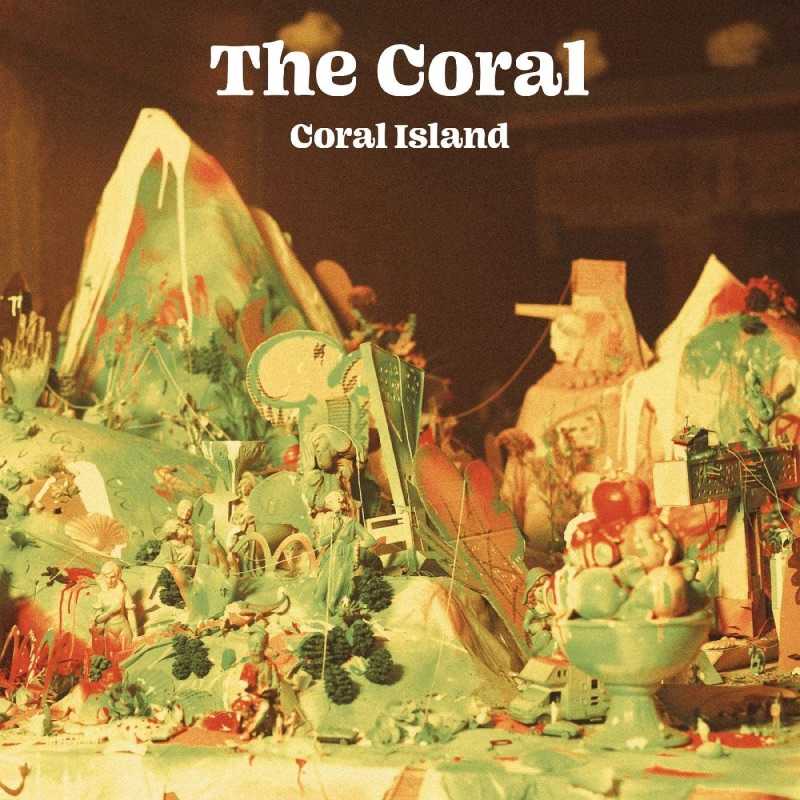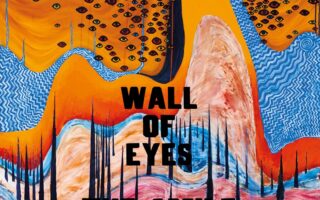
Mainstays of British alternative music for nearly twenty years, The Coral purposely walk out of step with whatever is regarded as cool that week.
They’ve always offered glimpses of their unique viewpoint, whether it be of hickory docks or of gypsy market blues, but it has only ever been allowed to be witnessed from afar, a netherworld of mischief. No more.
On Coral Island we are specifically and cordially invited into their world across 24 tracks. For those intimidated by the time required to commit to such an undertaking, fear not; nine of the said tracks are interludes, narrated by the grandfather of the Skelly brothers. As we navigate the funfair of the island, the album clocks in at under an hour.
The narrator, Ian Murray (otherwise known as The Great Muriarty), has a voice which both evokes his years of experience but also has a sprightly, impish quality which suggests it’s a family trait, but he’s a teller of tales rather than a ringmaster, as whimsically befuddled as the rest of us.
On opener Welcome To Coral Island (also the title of Part One of this double album), he tells us that, ‘you become an impression of yourself, whatever that means,’ a clear sign that we should leave logic in the harbour.
On Pavillions Of The Mind he posits that, ‘if the threat of danger is what steers you, come on in’, speaks of ‘retired carneys’ on The Great Lafayette and laments Coral Island as a purgatory on closing track The Last Entertainer.
The interludes are all backed with slightly naff yet ethereal music, the sort played through the tannoy at the funfairs of lost seaside towns. Musically, the pick of the bunch is Telepathic Waltz, featuring the sort of shuffling drums of which Tony Allen was a pioneer.
Speaking of the late legend, Welcome To Coral Island owes a debt to The Good, The Bad & The Queen’s Merrie Land, primarily in its mood. Harking back to an unspecified time, through a prism of halcyon and impossible memories of British times past, it’s slightly spooky because of it.
On Summertime, every bit as carefree as the title suggests, the guitars are made to sound as if they come from the busted speakers at the end of the uniquely British arcade. The toybox-sounding loop on My Best Friend evokes memories of a kids’ TV show from the 1980s, while on the nearly traumatic, swimming Watch You Disappear, James Skelly refers to ‘the waltzers of my dreams’.
So yes, dear reader, it’s a concept album (of sorts; more accurate to say the album has strong running themes), but The Coral are nothing if not avid and appreciative students of musical history.
Welcome To Coral Island takes its cues from the Small Faces’ seminal Ogdens’ Nut Gone Flake, arguably the finest of the genre. Broadly, Part One is about the attendees of the fair while Part Two (The Ghost Of Coral Island) covers the attractions themselves, e.g. the sinister Bond vibes of recent single Faceless Angel which may seem to relate to a person, but is actually the name of a ride at the ‘fair’.
Yet to not invest in the theme doesn’t detract from the enjoyment, or render it inaccessible. Although Coral Island is divided into sections, interspersed with the narration, the interludes merely signify a change in mood or tempo.
Lover Undiscovered, possibly the breeziest thing the band have done since In The Morning, conveys a sense of entering the day bristling with optimism before the protagonists venture to the fair.
Yet knowing this makes no difference; taken in isolation, it’s one of their finest singles to date, with a subtly widescreen chorus and an Americana, positive feel with a guitar solo that elevates it even further. The lyrics, however, suggest there is more than meets the eye as Skelly, in character, rebukes himself: ‘How could I forgive her for making me give myself away?’.
The happy atmosphere is sustained on Change Your Mind, a lost Tom Petty track with Beach Boy harmonies, like a purposeful drive across the mid-west (albeit not too fast).
After two sun-kissed offerings, the temperature lowers for Mist On The River, a xylophone-led number which works at its own pace, complete with Nick McCabe guitar ephemera buried low in the mix.
After the first interlude, the characters enter the fair to the sound of Vacancy, a timeless track with 1960’s polka guitar, 1950’s harmonies (think early Shirelles) and a glorious melody to boot.
And as the pattern and flow of the album becomes apparent, the melody is always king. This is no weird, avant-garde piece, but an album crammed with melodies and pop structures which sound timeless because they are.
The finger-picking, Dear Prudence-esque Old Photographs (‘negatives of nowhere towns’) may count as the most melancholic thing The Coral have ever done (in an admittedly crowded field), but with a yearnful chorus that sticks in the head immediately.
Another reference point for the album is Gorillaz’s Plastic Beach (and not just for the nautical undertones), on the oldest track here (Land Of The Lost) Skelly and co. combine the spooky harmonic of Gorillaz’s debut with the knowing strut of AM-period Arctic Monkeys, with some wonderfully indulgent guitar playing just for good measure.
To reveal more about the album would ruin its surprises, but as the waves wash away to nothing on closer The Last Entertainer, the inclination to go back to the beginning is strong.
As we re-emerge, blinking at the sun in these spring and summer months, to a world that has been devoid of people for over a year, here we have a ghostly yet positive soundtrack that fits perfectly.
It’s one of the many elements that makes Coral Island the band’s best and most fully-formed work to date. All aboard.




